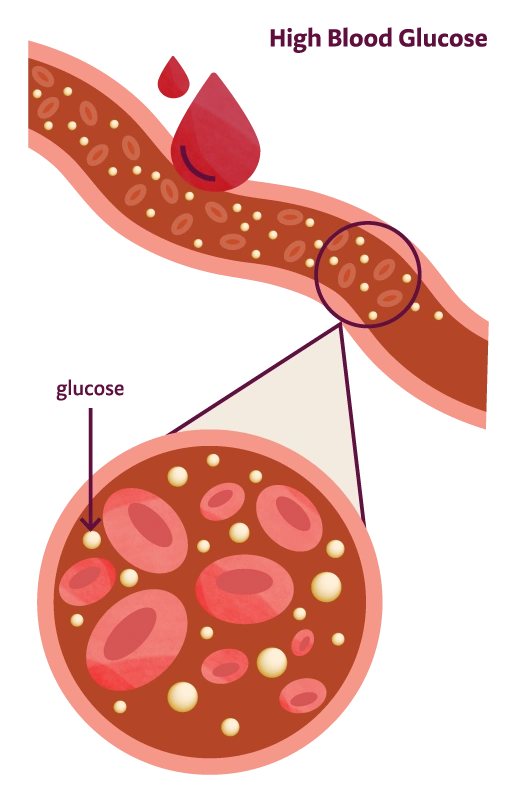Back to Health Resources
Understanding Blood Sugar

When you eat, your body turns the food into sugar (or glucose) that circulates in your bloodstream. As your blood sugar levels go up, this signals your body to release insulin, a hormone which breaks down the sugar so your body can use it as energy.
Your body usually keeps blood sugar levels in your body balanced. This balance is really important for your health. If your blood sugar level stays high for too long, it can lead to health problems like diabetes.
Diabetes is a chronic condition where you have too much sugar in your bloodstream. If you have diabetes, your body either doesn’t make enough insulin as the cells in your body don’t respond to insulin as they should, resulting in dangerously high glucose levels.
There are different types of diabetes:
Type 1 Diabetes
Type 1 diabetes is thought to be caused by an autoimmune reaction that stops your body from making insulin. This is the diabetes that kids sometimes have. Scientists are still learning about this type of diabetes, but currently no one knows how to prevent type 1 diabetes. If you do have it, it means you will need to inject insulin every day to manage your sugar levels.
Type 2 Diabetes
Type 2 diabetes is a more common type of diabetes, found in 90-95% of those who have diabetes. This is typically seen in adults. It develops over many years, and this type of diabetes is impacted by your weight, your diet, and your level of activity. The symptoms of type 2 diabetes are not always noticeable, so it is important to test blood sugar regularly.
Prediabetes
The term “prediabetic” does not mean you have diabetes, it means that your blood sugar is higher than normal, and you have a higher risk of developing type 2 diabetes. In the US, more than a third of the population has prediabetes and 80% of those people don’t know it.
Why High Blood Glucose is Bad for Cardiometabolic Health
While we know that high blood glucose can lead to diabetes, we also know it can disrupt the normal function of your body. Here are a few ways that high blood glucose can affect your overall cardiometabolic health:
- Leads to diabetes
- Damages blood vessels
- Narrows arteries
- Increases blood pressure
- Causes cholesterol to build up
- Triggers inflammation
- Causes clotting which can lead to heart attacks and stroke
If you are concerned about diabetes or prediabetes, the American Diabetes Association has some additional resources.

Measuring Blood Sugar via A1c Lab Test
The A1c test, which is also called a Hemoglobin A1c or HbA1c test, is a blood test that measures the average blood sugar levels in your body over the past 2-3 months. The A1c test measures the percentage of your red blood cells that have sugar-coated hemoglobin (hemoglobin is the molecule in red blood cells that carries oxygen). While some percentage is perfectly normal, elevated numbers indicate prediabetes or diabetes.
The CDC recommends that people who are overweight or who have other risk factors for diabetes, as well as all adults over 45 years old, get a baseline A1c test. Some factors like kidney disease, liver disease, severe anemia, and pregnancy can falsely affect your A1c, so speak with your doctor if you have abnormal results.
How to interpret your A1c test results:
| Normal | Below 5.7% |
| Prediabetes | 5.7% to 6.4% |
| Diabetes | 6.5% or above |
DISCLAIMER
The information provided on Care Access is intended for informational purposes only and should not be considered as a substitute for professional medical advice, diagnosis, or treatment. Always seek the advice of your physician or other qualified healthcare provider with any questions you may have regarding a medical condition. Our products and content are not intended to diagnose, treat, cure, or prevent any disease.
Explore More Health Resources

STORIES from the Heart

